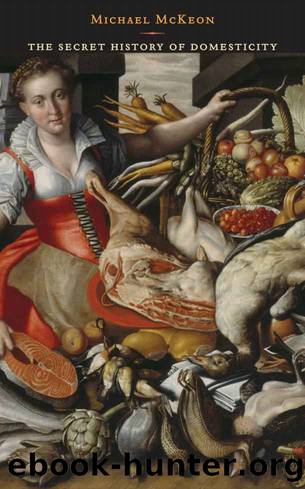The Secret History of Domesticity: Public, Private, and the Division of Knowledge (Director's Circle Book) by Michael McKeon

Author:Michael McKeon [McKeon, Michael]
Language: eng
Format: mobi
Publisher: Johns Hopkins University Press
Published: 2009-12-16T16:00:00+00:00
Sidney and Barclay
To speak of a founding text in the tradition of the English secret history is to invite dispute. Nonetheless, there may be general agreement that Philip Sidney’s Arcadia deserves this title.10 Several versions of Sidney’s prose romance exist; I will confine my discussion to the Old Arcadia, which was written sometime between 1579 and 1581. Sidney tells the story of Duke Basilius of Arcadia and his beautiful daughters, Pamela and Philoclea, who are courted by the wandering princes and cousins Musidorus and Pyrocles. The justification for reading the Old Arcadia as a political allegory lies in the fact that it is a pastoral romance and therefore invites the kind of allegorizing that Renaissance readers generally thought proper to the pastoral mode. In A Defence of Poetry (1595), which was written about the same time as the Old Arcadia, Sidney agrees that pastoral “sometime out of Meliboeus’ mouth can show the misery of people under hard lords or ravening soldiers” or “under the pretty tales of wolves and sheep, can include the whole considerations of wrong-doing and patience….”11 His narrative is punctuated by collections of eclogues attributed to the shepherds of Arcadia, and in “The First Eclogues” we are told of these shepherds that “of all other things, they did especially delight in eclogues; wherein sometimes they would contend for a prize of well singing, sometimes lament the unhappy pursuit of their affections, sometimes, again, under hidden forms utter such matters as otherwise were not fit for their delivery.” In his dedicatory epistle to his sister, Sidney referred to the Old Arcadia as an “idle work” and a “trifle,” a description that might seem to encourage her to find “matter” under its “hidden form.”12 Moreover, the penalties against seditious publication (hence the motive to disguise one’s meaning), although different from those in place a hundred years later, were a sobering reality of this period.13
The episodes in which the wandering princes first confront their beloveds in disguise support our sense of a reflexive relationship between Sidney’s content and form, the sense that disguise on one level implies disguise on the other. Having consulted the Delphic oracle, Duke Basilius hopes he will evade its obscure prophecy by taking his family into pastoral retirement. As we might expect, the vain attempt to hide from the world only brings the world into his hiding place. When Musidorus sees the rusticated Pamela, he disguises himself as the shepherd Dorus, whose “meanness” Pamela acknowledges even after he saves her from a marauding bear and she begins to suspect “that he came of some very noble blood—so noble a countenance he bare, and so worthy an act he had performed” (55, 53). Pyrocles, already having fallen in love with Philoclea’s picture, disguises himself as “an Amazon lady going about the world to practise feats of chivalry and to seek myself a worthy husband” (18). Musidorus is neither deceived nor amused. Anticipating the Earl of Shaftesbury’s advice to an author, “O sweet Pyrocles,” he says, “separate yourself a little, if it be possible from yourself, and let your own mind look upon your own proceedings….
Download
This site does not store any files on its server. We only index and link to content provided by other sites. Please contact the content providers to delete copyright contents if any and email us, we'll remove relevant links or contents immediately.
| Anthropology | Archaeology |
| Philosophy | Politics & Government |
| Social Sciences | Sociology |
| Women's Studies |
Cecilia; Or, Memoirs of an Heiress — Volume 1 by Fanny Burney(31332)
Cecilia; Or, Memoirs of an Heiress — Volume 3 by Fanny Burney(30934)
Cecilia; Or, Memoirs of an Heiress — Volume 2 by Fanny Burney(30889)
The Great Music City by Andrea Baker(21283)
We're Going to Need More Wine by Gabrielle Union(18072)
Bombshells: Glamour Girls of a Lifetime by Sullivan Steve(13108)
Pimp by Iceberg Slim(12931)
All the Missing Girls by Megan Miranda(12747)
Fifty Shades Freed by E L James(12451)
Norse Mythology by Gaiman Neil(11883)
Talking to Strangers by Malcolm Gladwell(11876)
Crazy Rich Asians by Kevin Kwan(8349)
Mindhunter: Inside the FBI's Elite Serial Crime Unit by John E. Douglas & Mark Olshaker(7833)
The Lost Art of Listening by Michael P. Nichols(6472)
Enlightenment Now: The Case for Reason, Science, Humanism, and Progress by Steven Pinker(6405)
Bad Blood by John Carreyrou(5768)
The Four Agreements by Don Miguel Ruiz(5510)
Weapons of Math Destruction by Cathy O'Neil(5036)
We Need to Talk by Celeste Headlee(4868)
